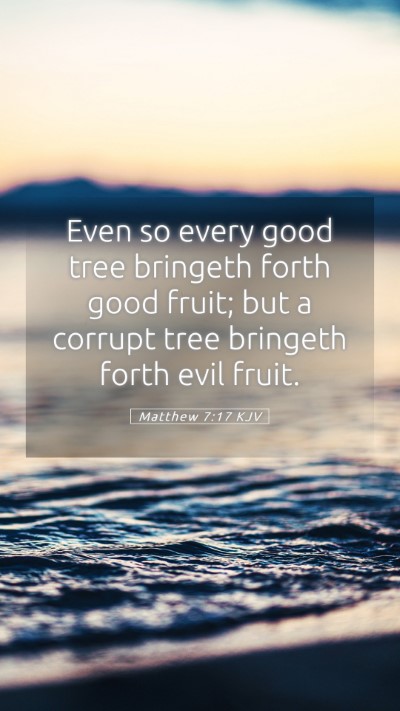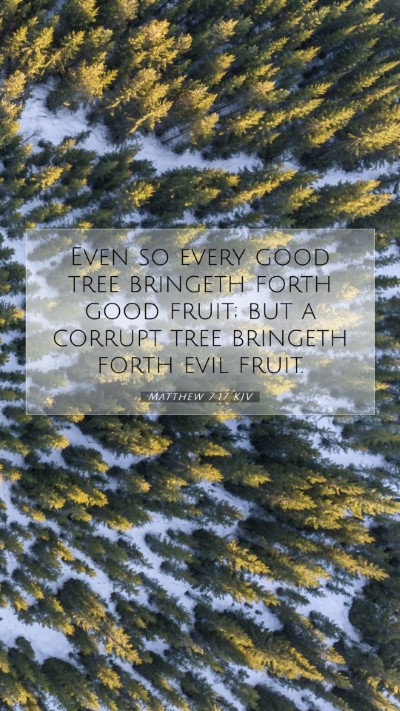Bible Verse Commentary: Matthew 7:17
Verse: "Even so, every good tree bringeth forth good fruit; but a corrupt tree bringeth forth evil fruit." - Matthew 7:17
Understanding Scripture
Matthew 7:17 presents a fundamental principle of discernment regarding the nature of individuals based on the fruits of their actions. This verse is part of Jesus' teachings during the Sermon on the Mount, where He instructs His followers on moral and ethical living.
Bible Verse Meanings and Interpretations
This verse uses the metaphor of trees and fruit, which suggests that a person’s inner character will ultimately produce visible outcomes. A 'good tree' symbolizes a righteous person whose actions reflect divine teachings, while a 'corrupt tree' indicates a person whose actions stem from a depraved heart.
Insights from Commentaries
- Matthew Henry: Henry emphasizes the moral implications of this verse, stating that the quality of one's life produces evidence that aligns with their inner moral state. He notes that the analogies of trees and fruit serve to illustrate that true righteousness will invariably manifest in good deeds.
- Albert Barnes: Barnes focuses on the certainty of this principle, arguing that Jesus asserts a clear division between good and evil. He highlights that actions (fruit) are a reliable gauge for evaluating the true nature of individuals.
- Adam Clarke: Clarke elaborates on the Jewish context of the metaphor, explaining how trees and fruits were commonly understood symbols of goodness and badness in ancient Israel. He indicates that this teaching also serves to warn about the dangers of false prophets.
Bible Study Insights
For those engaged in Bible study groups or utilizing online Bible study tools, Matthew 7:17 encourages a deeper Bible verse understanding through reflection on personal actions and the effects they have on others. It strengthens the importance of aligning one’s conduct with scriptural teachings.
Scripture Analysis
Jesus presents a clear dichotomy in this verse. The depiction of trees producing differing kinds of fruit invites adherents to introspectively consider their lives. This analysis urges believers to evaluate not only their own actions but also those of others, including leaders and influencers in their spiritual communities.
Applying Bible Verses to Daily Life
Understanding this verse calls for practical application in daily life. One must regularly inspect the "fruit" of their actions as guided by biblical principles, which require honesty, integrity, and compassion. Such introspection aligns with the broader theme of understanding difficult Bible passages and identifying the divine expectations placed upon believers.
Related Bible Cross References
- Luke 6:43-45: These verses echo the teaching on good and evil trees, reinforcing the message of assessing one’s heart through their actions.
- Galatians 5:22-23: The fruits of the Spirit are detailed here, providing a practical list of good attributes that stem from living a life in alignment with God’s will.
- James 3:12: This passage discusses the impossibility of a fig tree bearing olives, illustrating that one’s nature determines their output and reinforcing Jesus' teaching.
Conclusion
In summary, Bible verse explanations of Matthew 7:17 reveal profound insights about character and morality. The principle of discernment based on observable behavior is pivotal for believers in evaluating their lives and the lives of those around them. By examining the "fruits" one produces, individuals can better align themselves with Christ's teachings and foster a spiritually fruitful life.
Engaging with Scripture
For individuals seeking to deepen their Bible study lessons and enhance their understanding of Scripture, this verse serves as a powerful reminder of the importance of integrity and righteousness as reflections of one’s inner spiritual condition. Using this verse for Bible study topics can enrich discussions within study settings or personal reflections.


